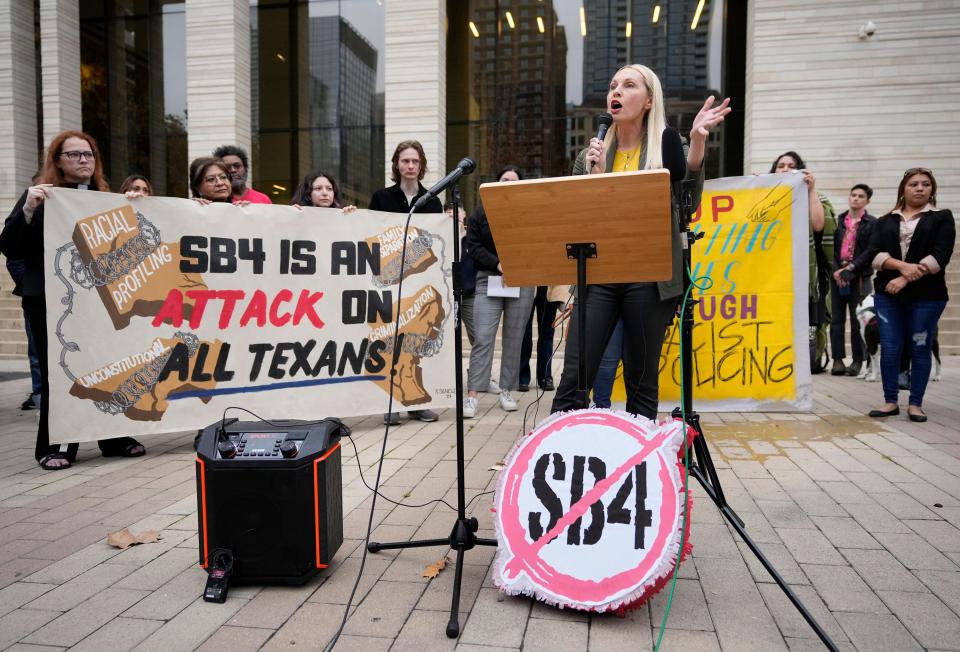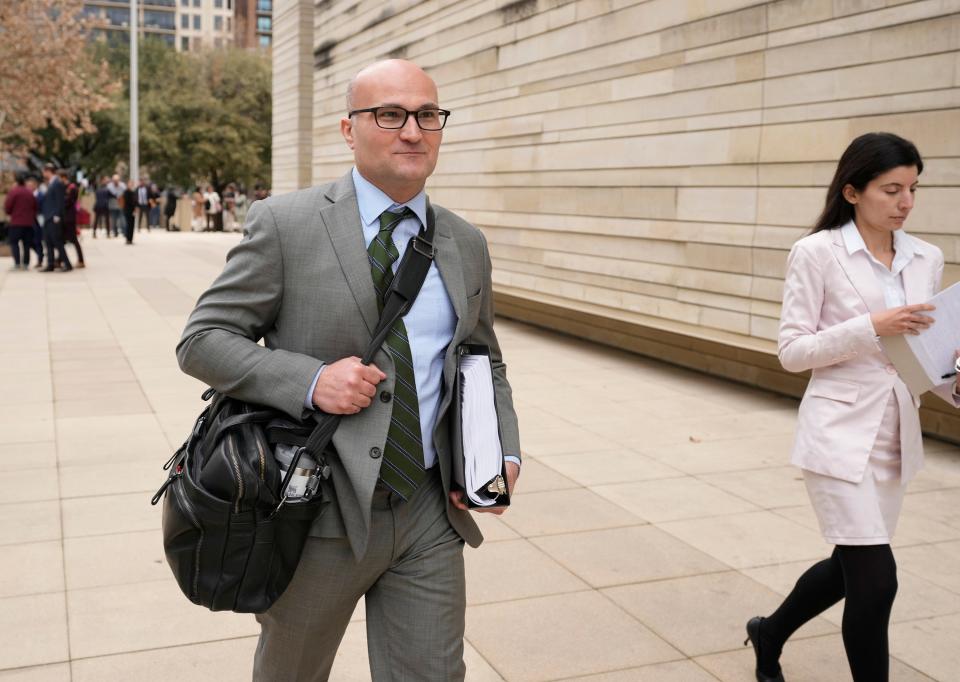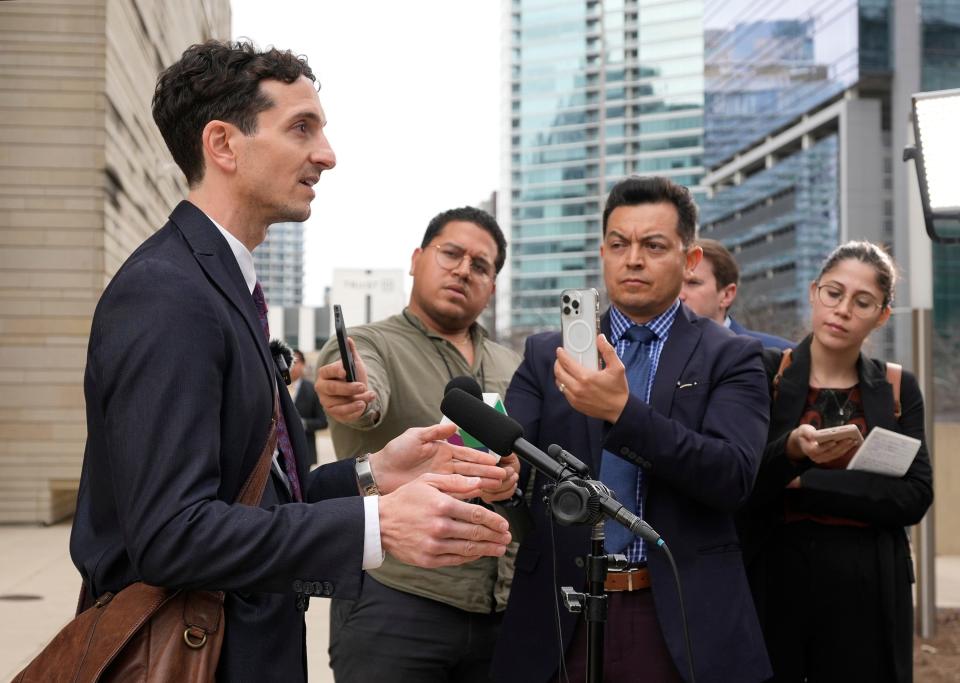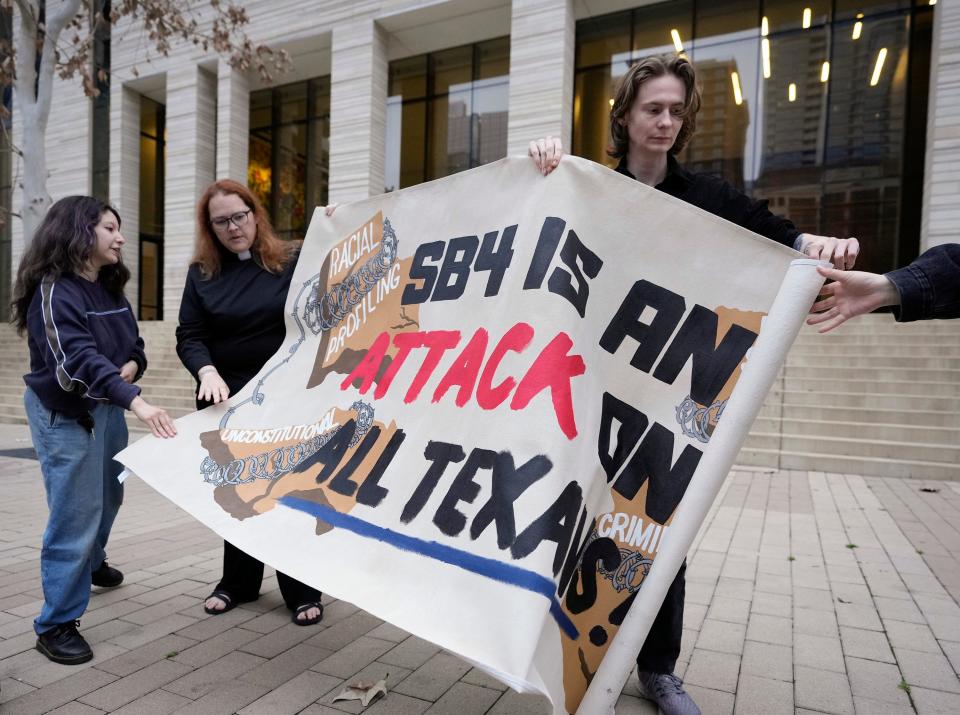Federal judge skeptical of Texas' sweeping immigration law, says ruling will come 'soon'
- Oops!Something went wrong.Please try again later.
A federal judge plans to quickly issue a ruling in a lawsuit over legislation designed to institute new penalties for illegal border crossings.
David Ezra, judge for the U.S. District Court for the Western District of Texas, said Thursday he will soon make the ruling on whether Senate Bill 4 is constitutional.
The bill is a state-level effort to curb illegal border crossings in Texas.
During a three-hour hearing, Ezra on many occasions bemoaned the confrontation between state and federal authority that SB 4 instigates in an effort to give Texas' law enforcement the ability to arrest, detain and deport those thought to have entered the country illegally.
Federal prosecutors take issue with provisions under the bill that give state officials the ability to exercise authority over a person's entry or removal from the country. They also decried the legislation as a hindrance to international relations, a violation of foreign commerce laws and an affront to the existing judicial process.
Federal prosecutors have categorically rebutted the state's ability to make decisions in the immigration arena. They argued throughout the hearing and in previous filings that it's an issue entirely under the purview of the federal government.
"While SB 4 would inflict concrete, irreparable harms on the United States, Texas fails to show that its absence will have any material impact," prosecutors wrote in the days leading up to the hearing.

Prosecutors also argue Texas' immigration law is based on the idea that the state has been forced to face an invasion by itself, which is not the case and, even so, legal precedent does not allow for the actions being taken to repel immigration.
More: Texas Latinos as large a voting bloc as ever. What this means for Democrats and Republicans
"There's been no abandonment here," U.S. Deputy Assistant Attorney General Brian Boynton said Thursday.
What is SB 4 and when would go into effect
Passed by the Legislature in November, SB 4 creates a series of penalties for those suspected of coming into Texas from Mexico other than through a legal international port of entry. The penalties range from a Class B misdemeanor to a second-degree felony.
SB 4, which is set to go into effect on March 5, requires people accused of illegally crossing the state's southern border to either accept a magistrate judge's deportation order or face a second-degree felony charge for noncompliance.
The law was immediately challenged in court after its passage.
Federal prosecutors entered their lawsuit in January, suing the state of Texas and joining a previous lawsuit filed late last year by the ACLU, ACLU of Texas, Las Americas Immigrant Advocacy Center, American Gateways, the Texas Civil Rights Project and the County of El Paso.

Gov. Greg Abbott and others praise SB 4, while judge expresses skepticism
In a campaign visit alongside Gov. Greg Abbott to the border last week, state Rep. David Spiller, R-Jacksboro, celebrated carrying SB 4 through the House, calling the legislation a "landmark" bill.
"It's not preempted by existing federal immigration law," Spiller said during the border news conference. "It's not in conflict with federal immigration law, that's in place and, mostly, Texas has the right, the constitutional right and authority, to secure its border."
Expressing skepticism, and at times criticism, of the legislation's structure, Ezra disagreed with the bill's author during Thursday's hearing, addressing concerns over the due process of migrants, the feasibility of the state's removal process and the ramifications of Texas setting a precedent for other states to follow in rejecting federal authority.
Although Ezra reiterated on multiple occasions that he views the complaints from state officials stemming from the border to be legitimate, citing previous experience adjudicating on the immigration issue previously in Arizona, California and South Texas.

But the question that wakes him up at 2:30 a.m., Ezra told attorneys during the hearing, is what happens when other states begin to follow Texas' example and introduce their own immigration interpretations, neglecting federal law in the process.
"And that's precisely the same thing that the Civil War said you can't do," Ezra said.
Texas argues in support of its immigration law, claims it's facing invasion alone
Ryan Walters, chief of special litigation in the Texas attorney general's office, argued that the state's attempt at immigration law should be seen as a mirror policy to those of the federal government and necessary on account of increasing immigration patterns.
More: How the border crisis sparked the worst Texas-federal relationship in modern memory
Walters, in front of the court and in previous filings, argued that seeking to delay the implementation of the law is not necessary as the concerns are based on situations that have not yet occurred.
Meanwhile, a group of nearly 50 members of Congress have signed an amicus brief, backing Texas' argument that the state has faced an invasion that has necessitated its own immigration policy.

"In the absence of any meaningful federal action, Texas has taken several measures to secure its borders and repel the invasion of criminal drug cartels and the flood of illegal aliens from around the world whom the cartels traffic into Texas." the lawmakers, led by U.S. Rep. Jodey Arrington, R-Lubbock, wrote in their brief.
There is also concern SB 4 could lead to an increase in arrests and strain the criminal justice system, the Harris County district attorney's office wrote in a separate amicus brief. Roughly 80,000 people could face charges, according to previous legislative testimony from the Texas Department of Public Safety.
Mandatory sentences under SB 4, which range between six months and 20 years, will affect the county's jail costs and possibly force further outsourcing of jail operations, the letter argues.
Additionally, community members might be more fearful of approaching law enforcement upon the implementation of the law, which is set to go into effect March 5.
When will the judge rule on SB 4
Saying he expects any ruling will be promptly appealed, Ezra said he expects to rule on whether to grant an injunction of SB 4 prior to the new law taking effect in March.
"I will try to get my decision out as quickly as I possibly can," Ezra said.
This article originally appeared on Austin American-Statesman: Federal judge skeptical of Texas' sweeping immigration, deportation law

